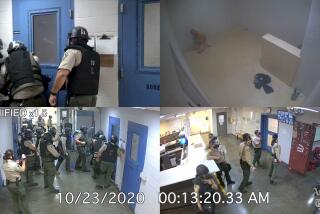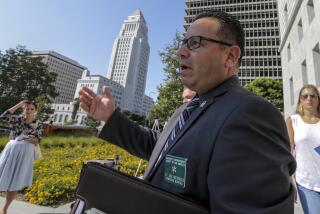Cop group with matching skull tattoos costs taxpayers $7 million in fatal shooting
Secret societies of Los Angeles County sheriff’s deputies with matching skeleton tattoos have long been a liability in cases in which inked deputies are accused of excessive force and harassment.
Now, county taxpayers will pay $7 million to settle a lawsuit brought by the family of a 31-year-old man who was shot and killed when deputies opened fire on him during a foot chase in 2016. Deputies claimed the man, Donta Taylor, had a handgun, but no weapon was found.
The settlement, approved by county supervisors Tuesday, is the largest deal in recent memory tied to a case featuring evidence about inked clubs of deputies.
Samuel Aldama, one of two deputies who shot at Taylor, admitted under oath to having a tattoo on his calf depicting a skull with a rifle and a military-style helmet emerging from flames. The letters “CPT,” for Compton, appear on the helmet, representing the station where Aldama worked.
Aldama said he was one of as many as 20 other deputies selected to get the same tattoo after “working hard” by making arrests and answering calls. He denied being part of a club.
But his admission about his tattoo during a deposition — and a photo of it that emerged in the lawsuit — became a central focus of the case as attorneys for Taylor’s family argued the killing was part of a pattern of excessive force by inked deputy gangs.
On Aug. 25, 2016, Aldama and his partner, Deputy Mizrain Orrego, were assigned to work on gang suppression when they encountered Taylor walking in an area controlled by the Cedar Bloc Pirus gang and wearing attire commonly worn by those affiliated with that crew, according to a district attorney’s review of the shooting.
The deputies claimed that Taylor reached into his waistband, revealing a semiautomatic stainless steel handgun, and ran away, according to a county corrective action plan. The deputies pursued Taylor on foot, splitting up as they rounded several corners, at times unable to see each other.
Both deputies claimed Taylor was holding or pointing the gun at them before they fired as many as 15 rounds, the county report says. An autopsy showed Taylor had been shot six times.
No weapon was found on Taylor or at the scene. Sheriff’s officials said tests on Taylor’s pockets and waistband turned up gunshot residue that was consistent with a handgun, according to the district attorney’s office. Prosecutors declined to file criminal charges after determining the deputies acted reasonably.
The department found the shooting was within policy but faulted the deputies’ tactics in splitting up during the foot pursuit, according to the county document.
The family said in the lawsuit that Taylor was never armed at any time during the encounter.
A judge in the case sided with Taylor’s family in ruling that the Sheriff’s Department must reveal whether they know the names of deputies who have matching skull tattoos at the Compton station. The case settled before any of that information emerged.
The department did not provide a comment about the settlement.
Orrego left the department in 2017. Aldama is still a patrol deputy in Compton.
John Sweeney, an attorney for the family, said he is pleased with the conclusion of the case.
“The county was wise to have settled this case because full exposure of this clique or gang may have resulted in a floodgate of litigation against the County of Los Angeles,” he said.
Sweeney said he believes the revelations about the tattooed group of Compton deputies contributed to the high settlement amount. County counsel, through a spokeswoman, declined to comment.
The county corrective action plan, which provides a summary about why a settlement is justified, makes no mention of Aldama’s tattoo or the existence of an inked group at the Compton station. The county and the Sheriff’s Department have traditionally shied away from acknowledging whether the groups may be linked to unlawful or out-of-policy behavior.
Another excessive force case involving the same deputies is pending in federal court. The county has denied allegations the deputies beat the plaintiff, Sheldon Lockett, or used racial slurs against him.
Coordinated ink has long been part of a fraternity subculture in the Sheriff’s Department, where exclusive groups — with monikers like the Jump Out Boys, Grim Reapers, and Regulators — have been accused of glorifying an aggressive style of policing.
Three decades ago, a federal judge said a deputy group known as the Vikings was a “neo-Nazi, white supremacist gang.”
Over the last several months, evidence of other groups has surfaced, including at the Palmdale and East Los Angeles stations. A deputy who was fired for alleged domestic violence and dishonesty and was later reinstated by Sheriff Alex Villanueva admitted to having a Grim Reaper tattoo associated with the South L.A. Station.
Villanueva has said deputies who get inked as part of station groups are involved in intergenerational “hazing.” He said he’s addressed problems of harassment by the Banditos clique at the East Los Angeles station by replacing the captain and other leaders. A lawyer for several deputies who say they were bullied, and in some cases beaten, by the Banditos says the crisis has not been alleviated.
Many deputies say the groups are harmless and are simply meant to boost morale.
The county, in partnership with the Office of the Inspector General, the Sheriff Civilian Oversight Commission and the Sheriff’s Department, has been conducting a study of gang culture among deputies with an aim to better manage it.
Next month, the county counsel is due to respond to a motion by Supervisors Sheila Kuehl and Hilda Solis that asked for a list of all cases against the county involving allegations of secret deputy cliques since 1990, as well as the amount the county had to pay out in each case.
A Times review last year — which did not include the Taylor settlement — found more than $7 million in county payouts over the previous decade in lawsuits claiming excessive force by deputies known to have matching tattoos as well as to settle a case alleging harassment by an inked deputy gang.
Also Tuesday, county supervisors approved a $1-million settlement in a case brought by Deputy Rosa Gonzalez, who said she was retaliated against after making a gender discrimination complaint at the East Los Angeles Station, which she claimed had a misogynistic culture perpetrated by the Banditos. The county denied her allegations.
Twitter: @mayalau
More to Read
Sign up for Essential California
The most important California stories and recommendations in your inbox every morning.
You may occasionally receive promotional content from the Los Angeles Times.











